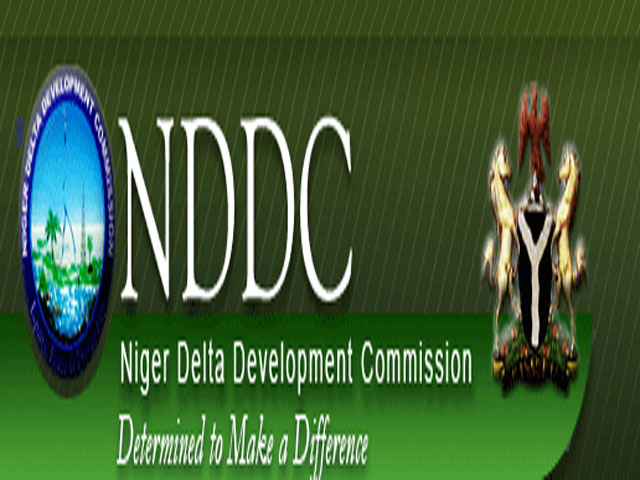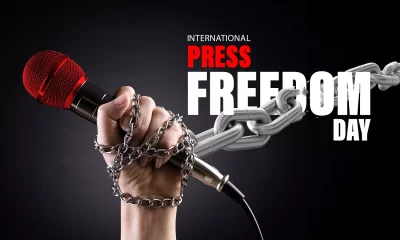Comments and Issues
See why NDDC is cesspool of corruption
Published
3 years agoon
By
Olu Emmanuel
By Emmanuel Onwubiko
The Niger Delta region is Nigeria’s bastion of crude oil resources which accounts for over 90 percent of the nation’s foreign exchange earner but the place from which the Country makes so much financial benefits is one of the most neglected environmental nightmares globally and the region suffers from multiple existential crises of Gross underdevelopment, high unemployment, high crime rates and political corruption which in the first place is the reason the region is not substabtially habitable for millions of her people.
The Niger Delta Development Commission as the name goes, was introduced as an immediate intervention to bridge the gaps in infrastructural developments of the neglected and marginalised region which serves as the Golden hen that gives Nigeria her central means of survival as a modern State in the comity of nations. That Nigeria is a big player in the Organisation of Petroleum Exporting Countries is because of the enormous natural resources found in the Niger Delta region.
However, due to bureaucratic corruption, political interferences and sundry other political crimes by the powers-that-be in Abuja, the NDDC has spectacularly failed to deliver developmental interventions to these crude oil bearing communities that needed these critical facilities so their people who have lost their primary sources of livelihood like fishing and farming due to activities of multinational crude oil drilling companies, have yet to get the benefits of this commission set up to cushion their pains.
For instance, the corruption in NDDC got to a crescendo in the current President Muhammadu Buhari’s administration which has continued to appoint ad-hoc leadership for the commission against the run of play and against the unambiguous legal and statutory law that set up the NDDC which we will very comprehensively debate in this piece.
Suffice it to state that the deep rooted corruption in NDDC made Nigerians to witness a drama that unfolded at the Federal House of Representatives during an investigative hearing over multibillion corruption scandals tearing the NDDC apart. Some of those dramatisation have found their ways into some creative songs released by some musicians in Nigeria.
During the course of the publicly televised investigation, the then interim administrator of NDDC dramatically collapsed as if he fainted due to the fact that he had no answers to the questions being thrown at him by the legislators.
Also the then Niger Delta minister who was a former governor of Akwa Ibom State was put on the podium to answer questions regarding alleged contracts scams but when he started to reel out names of big Nigerians including members of the National Assembly that was awarded juicy contracts running into trillions of Naira that they abandoned after being mobilised, he was forced to remain silent when the speaker to his podium was turned off on the directive of the chairman of the ad-hoc committeee of the Federal House of Representatives probing the scandals who was afraid that the minister was going to reveal some names of the powerful members of even that committee in the House of Representatives.
The action of this dubious probe panel revealed that virtually all big politicians are involved in the mess that have almost destroyed the NDDC. President Muhammadu Buhari ordered for forensic probe of the Commission but after investing billions in this exercise, the outcome of that forensic investigation has for over a year not being publicised. The same government appointed an interim administrator who has just being fired and indeed the new minister of Niger Delta has come up with a new dimension into the scam in NDDC. The Minister has shocked Nigerians with his discovery.
The Minister of Niger Delta Affairs, Obong Umana Umana, had just said that the disengaged Sole Administrator of Niger Delta Development Commission, NDDC, Effiong Akwa, must account for N300 billion projects awarded without due process under his leadership.
Speaking during a working visit to Rivers State, yesterday, Umana also directed acting Managing Directors of the NDDC, Emmanuel Audu-Ohwavborua, to mobilise SETRACO, contractor handling the Rivers-Bayelsa session of the East West Road to intervene on the portions collapsed by devastating floods.
Addressing the NDDC staff, the minister said: “The perception is that NDDC has failed. There is also the perception about widespread, endemic corruption in the commission. True or false, I don’t think it is a good story that you go somewhere and you are introduced as a staff of NDDC and the first thing the person must be thinking about you is that this must be one of the corrupt ones.
“Even for your children, it is not a good story. It is in your hands to change that perception. There is a total failure. It is that failure that makes it possible for one man to sit alone in this commission and issue awards letters without due process, of N200 billion, N300 billion, under the guise of emergency.
“This is clear cut impunity we cannot tolerate. Already we are talking of indebtedness of over N3 trillion and one man will still sit alone and issue letters of another N300 billion without following due processes? And this was during pendency of the forensic audit.
“The Acting MD is directed to give me full report, which should go to the President. This was without my knowledge, so I want a report; I want all of those contracts terminated immediately. No budget at the time those contracts were awarded.
“And I’ve seen people bring papers to me. One person will bring 10, 15 papers, talking about emergency repairs of failed portions of roads, 2kms, N800 million, in Delta, Abia and Imo states. If you use N800 million to fix 2kms of failed portions, how much are you going to use to construct the road?
“I just knew the conditions for the forensic audit were not conducive for that probe to be carried out, because if the perpetrators were the ones to support execution of the audit, then it wasn’t going to make any sense. Anybody who stands in the way to undermine the directive of Mr President will be appropriately sanctioned.
“Some contractors would be blacklisted, including the directors, from report of the forensic audit. We will take note of that because people are still awarding and signing contracts from their homes even she they have left the commission. This is anarchy, impunity.”
This writer believes that multiple illegality tearing down the walls of NDDC can’t be fixed unless the President heeded to the
URGENT CALL TO REVERT THE NIGER DELTA DEVELOPMENT COMMISSION (NDDC) TO THE DIRECT CONTROL AND SUPERVISION OF THE PRESIDENT AS PROVIDED IN THE ENABLING ACT.
It bears repeating to state as aforementioned that it is no news that oil is the main stay of Nigeria’s economy and the area which produces the same oil cannot be taken for granted if the good of the nation is intended.
It is this consideration that led to the establishment of the Niger Delta Development Commission (NDDC) in June 2000 via the Niger-Delta Development Commission (Establishment etc) Act, 2000 Act No 6 Laws of the Federation of Nigeria.
However in the light of the undeniable mismanagement of the resources of the Commission and its obvious poor performance over the years, it has become incumbent to urgently draw the attention of the President to the aberration which lies at the heart of the abnormally.
The Act established the NDDC directly under the control and supervision of the President and Commander-in-Chief of the Armed Forces of the Federal Republic of Nigeria. Section 7(3) of the Act provides thus:“The Commission shall be subject to the direction, control or supervision in the performance of its functions under this Act by the President, Commander-in-Chief of the Armed Forces of the Federal Republic of Nigeria.”
This is in line with the underlying basis for the establishment of the NDDC and the recognition of the need to ensure utmost efficiency in delivering on its mission. The long title of the Act buttresses this fact by stating that the formation of the NDDC was due to the need “to establish a new Commission with a re-organised management and administrative structure for more effectiveness.”
It is in this regard that section 2(2) and section 3(2) of the Act provides for the appointment of the governing Board of the Commission to be by the President and resignation of membership to be directly addressed to no other than the President. The Act therefore does not contemplate a legally official middle man between the Commission and the President. That was how the NDDC was meant to operate and did operate from its inception on establishment in June 2000 and that did not change even with creation of the Ministry of the Niger Delta Affairs (MNDA) on September 10, 2008.
We need to put on our thinking cap and get back our retentive memories of historical facts and then we will recall that it was sometime in November 2015, the President was misguided by the recommendation of the MNDA, with Pastor Usani Uguru as Minister, to move the NDDC from the President’s direct control and supervision to the MNDA.
Eventually during the October 1, 2019 Independence Anniversary broadcast, the President confirmed that the NDDC had been moved to the MNDA in violation of the enabling Act. Besides the obvious fact of the violation of the extant law, the act of the president is submission of the NDDC to the bureaucracy of the civil service and politicking of the Minister of MNDA which is retrogressive. The NDDC is now akin to an unwanted child, not only handed to an unattached and emotionless “carer” in MNDA but also one been abandoned to the be-deviling evils of such a carer. At the heart of the twin evil of bureaucratization and politicization of the Commission is the perennial corruption cankerworm. The last House of Representatives probe of the NDDC sheds light on the terrible state of the Commission under the Ministry; of course it means the NDDC is now under more avoidable negative influences than it would have been if it were directly under the President as stipulated in the Act.
What that portends is that the resources of the NDDC are now subject to more interests than ought to be. This is quite unfortunate with the unwritten rule of interests and corruption which states that the more hands are involved in the process of utilization of resources, the more same diminish for the ultimate purpose for which it is allocated and the meager the utility for the intended beneficiaries. There is also the problem of the usurpation of the functions of the governing Board of the NDDC by the MNDA. Section 8 of the Act confers on the Board the power to manage and supervise the affairs of the Commission; make rules and regulations for carrying out the functions of the Commission; enter and inspect premises, projects and such places as may be necessary for the purposes of carrying out its functions under this Act; pay the staff of the Commission such remuneration and allowances as appropriate, enter into such contracts as may be necessary or expedient for the discharge of its functions and ensure the efficient performance of the functions of the Commission; and do such other things as are necessary and expedient for the efficient performance of the functions of the Commission. These are the exact functions arrogated to the MNDA.
That is why the NDDC can afford to operate without a board, being stage-managed by the Ministry. Thus the subjecting the NDDC to the MNDA is not only a violent takeover in form but also its operation is a most illegal abrogation of law. Nothing like the MNDA ought to exist where there is such an elaborate law as the Act establishing the NDDC which has specified who does what and how.
It is sad that the NDDC has not only been made an orphan by virtue of its separation from Mr President but has also been somewhat disowned and abandoned by the President who has abdicated his responsibility to it. This is particularly more painful for this suffering orphan who watches her sibling of the North East Development Commission (NEDC) enjoying the affection of the father President as contained in section 8(3) of the North East Development Commission (Establishment) Act 2017 which is in pari-material with section 7(3) of the NDDC Act which on the contrary has been jettisoned.
It is tantamount to paying lip service and in fact a disservice to the people of the Niger Delta area for the Commission to be made to suffer the usual handicap of the civil service considering the relevance of the area to the income, survival and development of Nigeria as a nation. It is for the foregoing reason that we call on the President to urgently comply with the extant law and remove the NDDC from the Ministry of the Niger Delta Affairs and bring it under his direct control and supervision as contained in the Act.
After all what is good for the goose is also good for the gander. The earlier this existential impediments erected deliberately by President Muhammadu Buhari is eradicated, the better for any sorts of efforts at implementation of comprehensive and functional developmental measures and remedies to confront the infrastructural deficit of the massive crude oil producing communities of the Niger Delta Region of Nigeria.
*EMMANUEL ONWUBIKO is head of the HUMAN RIGHTS WRITERS ASSOCIATION OF NIGERIA and was NATIONAL COMMISSIONER OF THE NATIONAL HUMAN RIGHTS COMMISSION OF NIGERIA.
Trending

 Health1 week ago
Health1 week agoSinger’s death sparks doctor’s takedown of snakebite myths, exposes public health gaps

 Comments and Issues6 days ago
Comments and Issues6 days agoIfunanya died in the capital city—what hope is there for rural Nigerians?

 Education6 days ago
Education6 days agoOgun students call for increased funding to improve tertiary institutions

 Comments and Issues6 days ago
Comments and Issues6 days agoThe silent press and the silent siege

 Football1 week ago
Football1 week agoBarcelona moves to secure Rashford permanently, target Romero

 Crime1 week ago
Crime1 week agoGunmen kill Anambra community leader in suspected cult revenge attack

 Football6 days ago
Football6 days agoAntony strikes as Real Betis exact revenge on Atletico Madrid

 Energy6 days ago
Energy6 days agoNCDMB introduces stricter guidelines to eliminate unqualified firms from oil contracts

